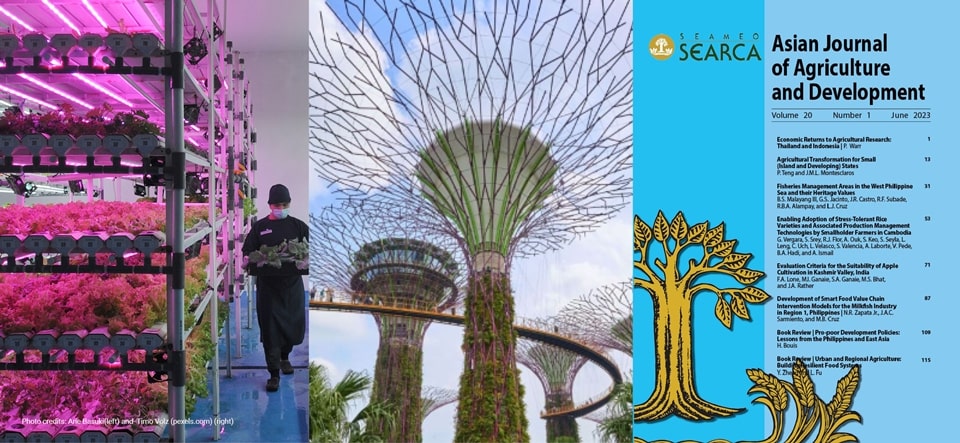
The June 2023 issue of the Asian Journal of Agriculture and Development (AJAD) presents fresh perspectives on Thailand's and Indonesia's domestic investments in agriculture, Singapore's successful "leapfrogging" model of growth, and valuing heritage in the disputed West Philippine Sea, and also three other articles on various Asian countries and two book reviews.
In his paper "Economic Returns to Agricultural Research: Thailand and Indonesia," Australian National University Emeritus Professor Peter Warr reiterates how knowledge generated from scientific research helps raise agricultural productivity in developing countries, amidst increasing pressures on production resources. He asked how effective public sector research is in raising productivity. Evidence he gathered and his subsequent calculations show that Thailand's and Indonesia's own expenditures have not increased agricultural productivity, owing to lower investments in research compared with other forms of spending. He, thus, suggests for more public investments in agricultural research, especially for technologies designed elsewhere to adapt to local conditions.
Dr. Paul Teng and Jose Ma Luis Montesclaros of the Nanyang Technological University Singapore postulate that, for small states, a clearer path to economic transformation may be to develop the urban industrial and service sector first, contrary to the long-held economic transformation pathway model propelled by agriculture. In their paper "Agricultural Transformation for Small (Island and Developing) States," the authors take the demonstrated successes of Singapore to show that transformation may take a path where agriculture is initially sacrificed in favor of more high-value urban economic activities. This alternate development pathway emphasizing urban industrialization may serve as a "leapfrogging" model for small cities and small developing states in a contemporary, technology-enabled landscape.
Ongoing geopolitical disputes over the South China Sea, particularly pertaining to the West Philippine Sea, makes the study of Dr. Ben Malayang III and his co-authors relevant. In "Fisheries Management Areas in the West Philippine Sea and Their Heritage Values," the authors call to urgently protect, conserve, and sustain the "heritage value" of fisheries areas in the face of political and territorial disputes. Foreign-fleet poaching is the most concerning threat to fisheries and biodiversity in the disputed area. Thus, authors urge for policies and actions that will incentivize investments on (1) ensuring safe access to the fisheries areas, (2) establishing coastal and nearshore protected areas, (3) protecting the livelihoods of registered fishers and communities, and (4) research and development.
The following full research papers and book reviews complete the AJAD volume 20.1:
- Enabling Adoption of Stress-Tolerant Rice Varieties and Associated Production Management Technologies by Smallholder Farmers in Cambodia
- Evaluation Criteria for the Suitability of Apple Cultivation in Kashmir Valley, India
- Development of Smart Food Value Chain Intervention Models for the Milkfish
- BOOK REVIEW | Pro-Poor Development Policies: Lessons from the Philippines and East Asia
- BOOK REVIEW | Urban and Regional Agriculture: Building Resilient Food Systems
AJAD is an international refereed journal published by the Southeast Asian Regional Center for Graduate Study and Research in Agriculture (SEARCA). AJAD publishes articles resulting from empirical, policy-oriented, or institutional development studies, as well as articles of perspectives on agriculture and development, political economy of rural development, and trade issues.
AJAD is particularly keen to publish studies on digital agriculture, food security (amidst global shocks), water resources management, international trade and globalization (such as the ASEAN Regional Comprehensive Economic Partnership), and agricultural policies and governance. Submissions are welcome all year-round through https://ajad.searca.org. All the new and past papers published in AJAD are available from the same site for free, while print copies are also available through subscription.
The editorial board is headed by Dr. Cielito F. Habito, professor of economics at the Ateneo de Manila University in the Philippines and director of the Ateneo Center for Economic Research and Development. He is also a former cabinet member of the Philippine government, having served as Socioeconomic Planning Secretary and Director General of the National Economic and Development Authority of the Philippines.